The Militia Camp; 18 Sep 1885
Topic: Canadian Militia

The Militia Camp; 18 Sep 1885
General Middleton to be Here on Tuesday
The Review Fixed for Wednesday the 22nd
The easiest solution of the difficulty would be to abolish the salute altogether. It takes a long time to learn, and when a man does know it he can't shoot at an enemy with any greater degree of precision.
The London Advertiser, London, Ont., 18 September 1885
Wednesday night proved particularly cold on Carling's farm [present location of Wolseley Barracks, London, Ontario], and many of the volunteers found it impossible to obtain much sleep. Two blankets is far too little at this season of the year, and if a man puts one under him the other amounts to very little when thrown over him. However, a brisk 6 o'clock parade in the morning set all this right, and gave the men a good appetite for breakfast. Fortunately they fare better in the matter of food than clothing, the eatables furnished by the contractors being of first-class quality.
Rifle Practice
Immediately after breakfast yesterday morning, four companies of the 21st battalion marched to the Cove range and spent the day in rifle practice under the supervision of Major Bigger, musketry instructor. Some very fair scores were made, but the majority of the men show want of practice. The other battalions were put through their marching drill, and they already begin to show rapid improvement. Corps which only go into camp every second year can hardly be expected to turn out a large number of efficient soldiers Still, through the strenuous efforts of energetic officers, the majority of the battalions in the district have been brought to camp in a tolerably fair condition, and some of them far better than could be expected. What some recruits find it hardest to get through their heads, however, is the salute.
The Salute
There are so many different ways, under different circumstances, that this is not to be wondered at. It is easy enough for a volunteer to understand that when passing an officer it is proper to salute with the hand furthest away. He can remember that all right. But when his is required to remember, also, that in case the officer passes him as he stands he has simply to stand at attention; again, if his hands are full, he has only to look toward the officer, or, if he be on a sentry beat, to shoulder arms, and turn to his front for a company officer and present arms for a commanding officer; or if he is mounted, simply to turn his eyes towards the officer; or if he is carrying a rifle, in passing and officer to bring the rifle to the shoulder and pass the left hand across the body and touch the sling. No volunteer with ten days' drill could ever be expected to get all these different modes of salutation down to perfection, and consequently amusing mistakes sometimes occur. For instance, the other day an officer stepped up to a sentry, and said: "Here comes the main guard; see that you present arms properly." The officer was surprised a moment later to see the sentry bring his rifle to the shoulder, cock the hammer, and draw a bead on the leading rank. Another sentry was observed walking up and down his beat with his rifle at the "present," when a staff sergeant was passing. The easiest solution of the difficulty would be to abolish the salute altogether. It takes a long time to learn, and when a man does know it he can't shoot at an enemy with any greater degree of precision.
The Review
General Middleton has intimated that he will probably be hereabout the 22nd inst., and the review has therefore been fixed for the succeeding day. It will commence between 10 and 11 o'clock in the morning and last until about 3. Owing to the presence of three batteries of artillery and four troops of cavalry, together with a larger number of infantry than usual, nearly 1,800 altogether, it is expected it will be much better and more interesting than former ones.
Brigade Orders; Camp, London, Sept. 17
Detail for to-morrow—Field officer of the day, Lt.-Col. Munroe, 22nd Battalion, next for duty, Lt.-Col. Wilkinson, 21st Battalion; surgeon of the day, Surgeon Smith, 28th Battalion; next for duty, Surgeon Holmes, 24th Battalion.
No. 1—All mail matter will be delivered at the provost tent, as per paragraph No. 11, brigade orders, 5th September, inst.
No. 2—No officers' servants or orderlies will be permitted to leave the camp unless properly dressed.
No. 3—The battalion furnishing the duties for the day will detail two non-commissioned officers for gate duty, the one to relieve the other at the main entrance to the camp, and they will be held responsible that all men leaving the camp by the main entrance have passes and are properly dressed. These non-commissioned officers will parade with the main guard, with waist belts and side arms only; any assistance required by these non-commissioned officers will be furnished by the main guard.
No. 4—Two waiting men, properly accoutred, will accompany the several guards at guard-mounting daily.
No. 5—The whole of the brigade will parade tomorrow, in drill order, at 2:45 p.m., rear of the provost tents facing south, the battalion markers to be on the ground five minutes before the hour named to take up the position for their respective corps.
Notes
Diarrhoea is rather bad among the men, and a large number are on the sick list from this complaint.
Large numbers of visitors watch the volunteers drilling every afternoon.
To-day the whole brigade will be inspected by Lieut.-Col. Clarke and will march past in double quick time, in open and close column, etc. These movements will be worth witnessing.
The Y.M.C.A. have, as usual, opened a tent upon the ground, where the volunteers are furnushed with accommodations for writing, reading the daily papers, etc., gratis.
Major Martin, on our report the other day, was credited with coming from Tilsonburg. It should have been Tilbury East.
Lieut. Fairbanks, of the London Field Battery, arrived and took up his quarters in the camp to-day. He was warmly welcomed by the "boys."
The drill instructor of the 22nd Battalions is Sergt. Wilson, of the Kentish (England) Regulars. He is an excellent instructor, and has one of the best-drilled, neatest battalions in the camp.
Rev. Mr. Ball, chaplain of the 7th Fusiliers in the Northwest, is again out at camp, and will officiate at the service to the volunteers there on Sunday morning.
A number of volunteers came down to Barnum's circus the other night, and afterwards got drunk. While noisily going along the street a policeman told a sergeant if he wasn't quieter he would arrest him. The sergeant drew his sword-bayonet and dared the policeman to do it, and the policeman accepted the challenge, collared him, and made him put up the sword, and took him to the Police Station. At the request of his captain the magistrate let him off lightly next morning.

Posted by regimentalrogue
at 12:01 AM EDT
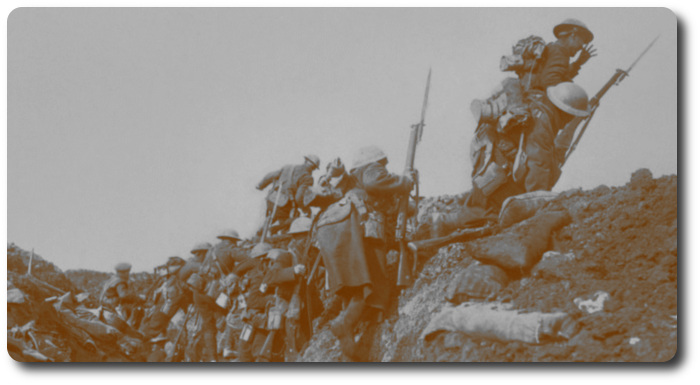


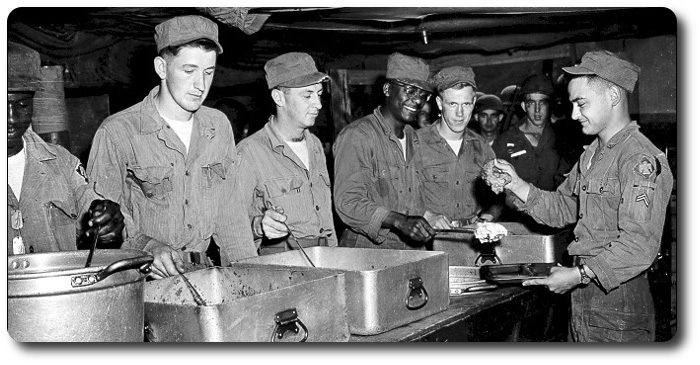
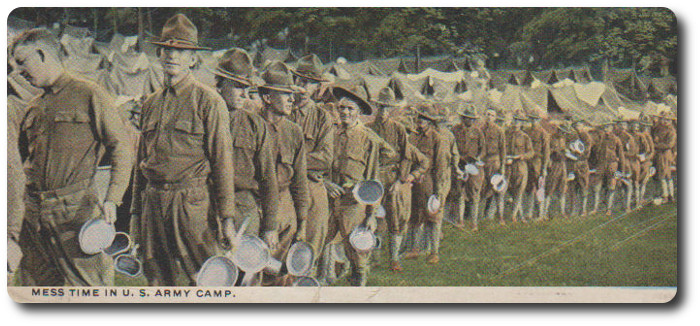

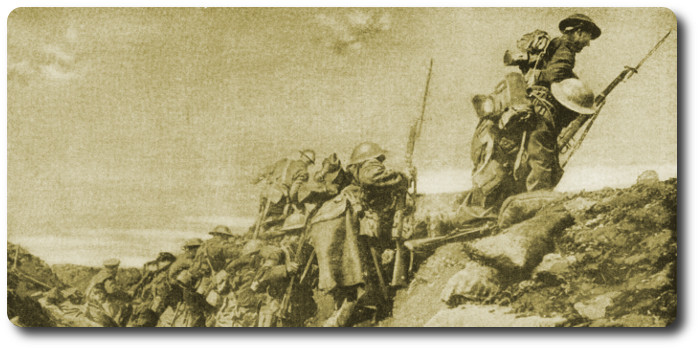

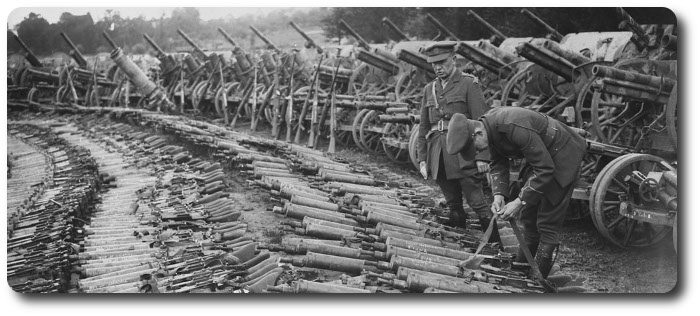
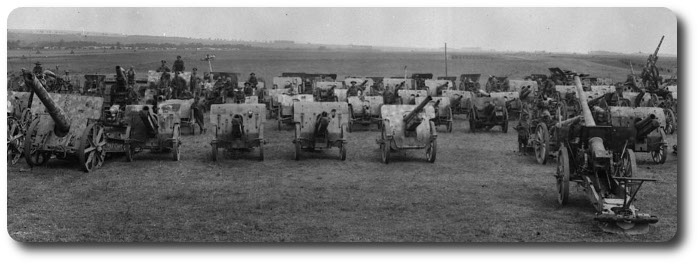

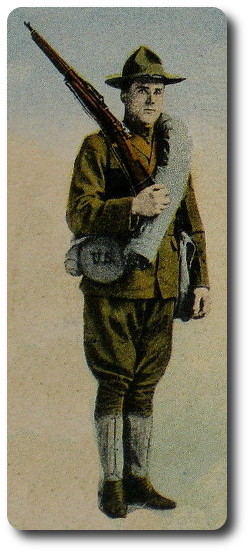 The average civilian, no matter how brave he might be, has little desire to go into battle. Even though he knows very well that the chances of his being killed or wounded are comparatively small, yet the thought of placing himself in a post of danger face to face with a well trained and courageous enemy is more or less terrifying to him.
The average civilian, no matter how brave he might be, has little desire to go into battle. Even though he knows very well that the chances of his being killed or wounded are comparatively small, yet the thought of placing himself in a post of danger face to face with a well trained and courageous enemy is more or less terrifying to him.

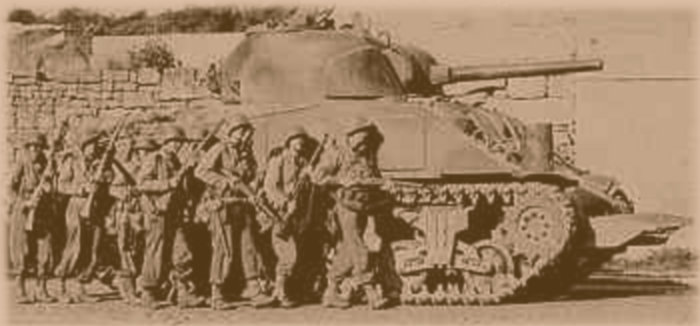
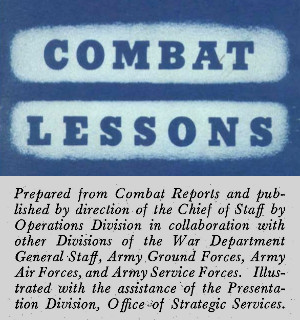 Combat Lessons, Number 2, September 1946
Combat Lessons, Number 2, September 1946

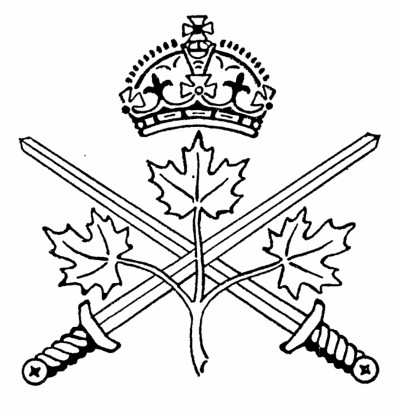
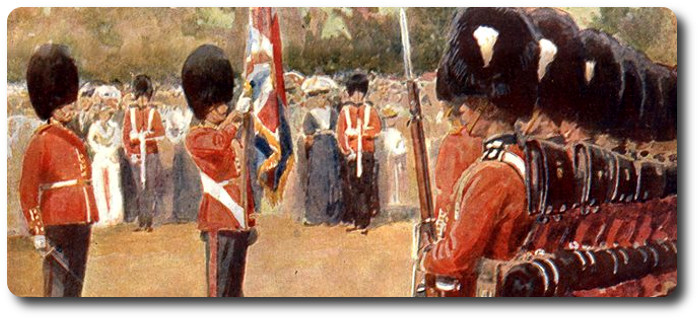
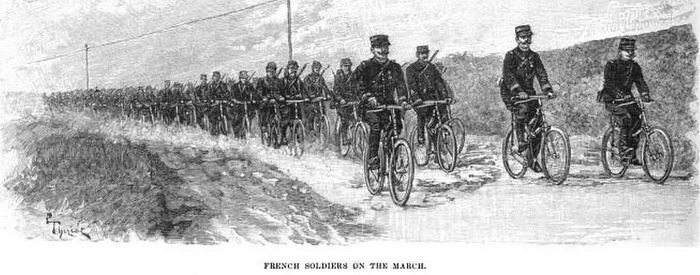
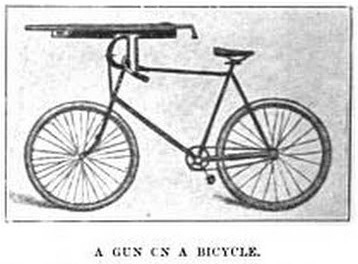 The serious consideration that France is giving the bicycle in connection with service in war, has led the military experts all over the civilized world to take up the matter, but as an admirable article in the London Daily Mail says: "Little has been done by any of the great Powers, although experts have long agreed that the bicycle will play an important part in the next war." But it is not the "faddy" or "ornamental" order with which the French have taken it up. Captain Gerard, a young officer of the French army, is proving by severe tests that bicycle corps can be trained to very nearly take the place of cavalry. He has been training his men to the performance known as the "cleaving of the Turk’s head" with the bicycle instead of the horse. It was found to be extremely difficult at first, and the slightest shifts in the saddle caused a spill. But the men soon acquired great proficiency, and demonstrated that the weight and impetus of the horse count as little, and that the feat is accomplished by strength and dexterity alone.
The serious consideration that France is giving the bicycle in connection with service in war, has led the military experts all over the civilized world to take up the matter, but as an admirable article in the London Daily Mail says: "Little has been done by any of the great Powers, although experts have long agreed that the bicycle will play an important part in the next war." But it is not the "faddy" or "ornamental" order with which the French have taken it up. Captain Gerard, a young officer of the French army, is proving by severe tests that bicycle corps can be trained to very nearly take the place of cavalry. He has been training his men to the performance known as the "cleaving of the Turk’s head" with the bicycle instead of the horse. It was found to be extremely difficult at first, and the slightest shifts in the saddle caused a spill. But the men soon acquired great proficiency, and demonstrated that the weight and impetus of the horse count as little, and that the feat is accomplished by strength and dexterity alone.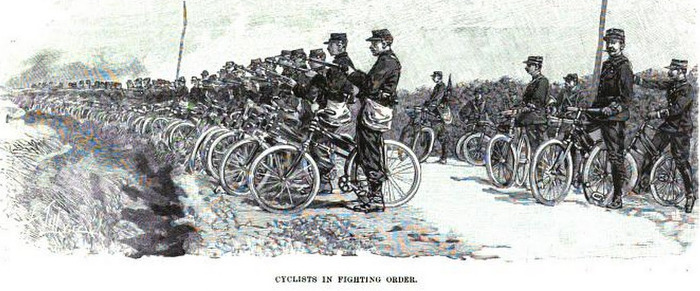
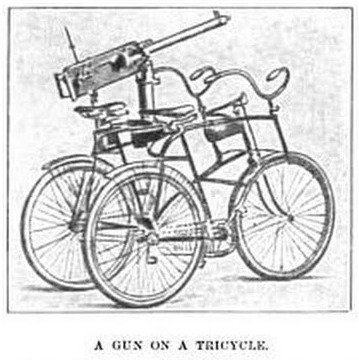 It is, however, in skirmishing that the bicycle promises most. A commander marching into an enemy’s country has had in times past to rely upon a corps of fleet horsemen to "feel the way" and follow the movements of the enemy. The extent of territory over which this could be done daily was limited by the powers of the horse. The bicycle skirmishers, however, would suffer under no such limitations. The transportation of fodder for the horses is one of the most serious problems that confront a military commander, and their care entails a vast amount of labour, which takes so many men out of the list of available fighters. Many times in history the approach of an enemy has become known by the tramping of the horses, which, upon a hard road, can be heard a long way off on a still night. Experienced campaigners have detected this ominous sound when the horses were miles away. Nothing of this kind would be possible. Again, a mounted horseman makes a large object at night, but a cyclist crouching low could only be seen with difficulty, and would make a very difficult target to hit. The tandem skirmishers are specially formidable. They have a speed which no horse can attain. In times of danger the rider in front can bend low and work the pedals while his companion can fire over his shoulder. Altogether the French officer in charge of the experiment has demonstrated to his own satisfaction the superiority of the bicycle over the horse for many purposes in warfare.
It is, however, in skirmishing that the bicycle promises most. A commander marching into an enemy’s country has had in times past to rely upon a corps of fleet horsemen to "feel the way" and follow the movements of the enemy. The extent of territory over which this could be done daily was limited by the powers of the horse. The bicycle skirmishers, however, would suffer under no such limitations. The transportation of fodder for the horses is one of the most serious problems that confront a military commander, and their care entails a vast amount of labour, which takes so many men out of the list of available fighters. Many times in history the approach of an enemy has become known by the tramping of the horses, which, upon a hard road, can be heard a long way off on a still night. Experienced campaigners have detected this ominous sound when the horses were miles away. Nothing of this kind would be possible. Again, a mounted horseman makes a large object at night, but a cyclist crouching low could only be seen with difficulty, and would make a very difficult target to hit. The tandem skirmishers are specially formidable. They have a speed which no horse can attain. In times of danger the rider in front can bend low and work the pedals while his companion can fire over his shoulder. Altogether the French officer in charge of the experiment has demonstrated to his own satisfaction the superiority of the bicycle over the horse for many purposes in warfare.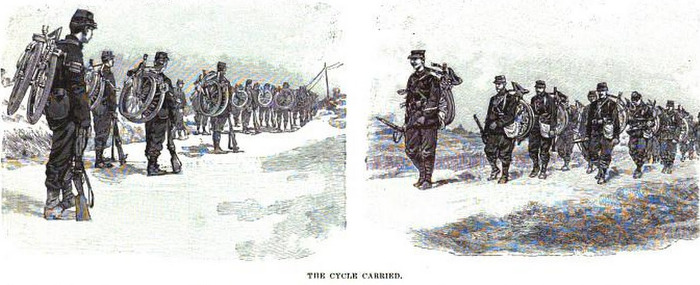
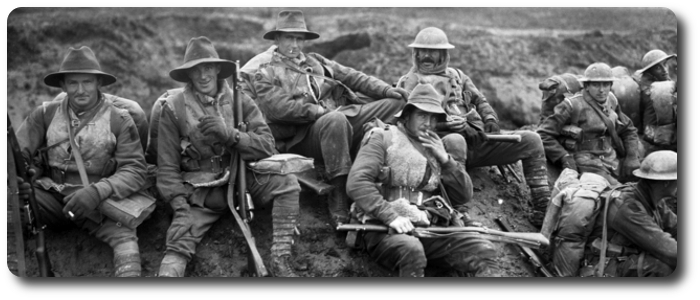
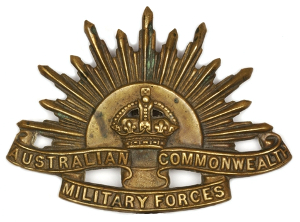 Whatever the Australian troops may be called upon to undergo in the nature of hard rations in the field, when they are in the depot and standing camps in Australia they have abundant and excellent food. Their ration is more liberal than that of almost any army in the fighting fields today, or amongst the forces of the mobilised central powers. Bully beef and biscuits, jam, biscuits and bully beef, jam, alternated, disguised with a dash of vegetables, was the ration at Anzac. It was a good ration, too, for any army fighting and moving every day, and with an abundant water supply available. But it was monotonous diet for such a campaign as Gallipoli, and unhealthy as well when the water supply was so strictly limited. Casting aside the condiments, and the little extras that came to hand, this was the staple food of the Australian army in the field. Compare it with the 1 ¼ lb. bread (or 1 lb. biscuit), and 1 1/2 lb. meat (or 1 lb. fresh or salt fish), 1 lb. potatoes and 8 oz. mixed vegetables that the troops at the camps throughout the Commonwealth have as the basis of their daily meals. Flour, rice and curry powder are a weekly ration, which helps the cooks to give variety to a breakfast, lunch or dinner. An army fights on its stomach; it builds up reserve in physique, muscle and toughened sinew by long hours of drilling, marching, exposure to the elements; it lives and prospers on the rations that are provided after a day of vigorous training and campaigning.
Whatever the Australian troops may be called upon to undergo in the nature of hard rations in the field, when they are in the depot and standing camps in Australia they have abundant and excellent food. Their ration is more liberal than that of almost any army in the fighting fields today, or amongst the forces of the mobilised central powers. Bully beef and biscuits, jam, biscuits and bully beef, jam, alternated, disguised with a dash of vegetables, was the ration at Anzac. It was a good ration, too, for any army fighting and moving every day, and with an abundant water supply available. But it was monotonous diet for such a campaign as Gallipoli, and unhealthy as well when the water supply was so strictly limited. Casting aside the condiments, and the little extras that came to hand, this was the staple food of the Australian army in the field. Compare it with the 1 ¼ lb. bread (or 1 lb. biscuit), and 1 1/2 lb. meat (or 1 lb. fresh or salt fish), 1 lb. potatoes and 8 oz. mixed vegetables that the troops at the camps throughout the Commonwealth have as the basis of their daily meals. Flour, rice and curry powder are a weekly ration, which helps the cooks to give variety to a breakfast, lunch or dinner. An army fights on its stomach; it builds up reserve in physique, muscle and toughened sinew by long hours of drilling, marching, exposure to the elements; it lives and prospers on the rations that are provided after a day of vigorous training and campaigning.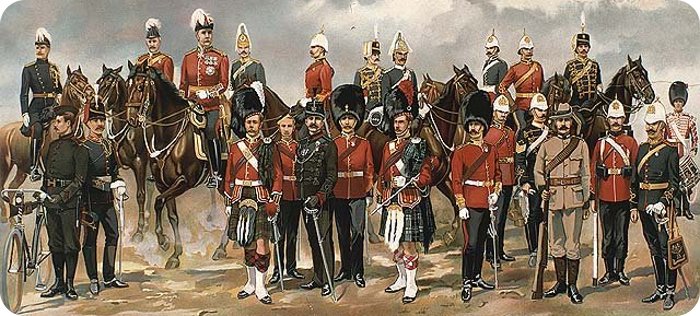
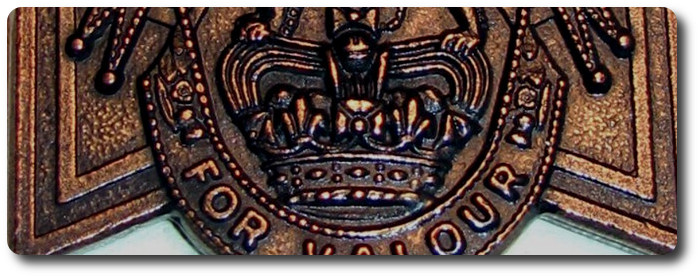
 London— (CP)—The
London— (CP)—The 
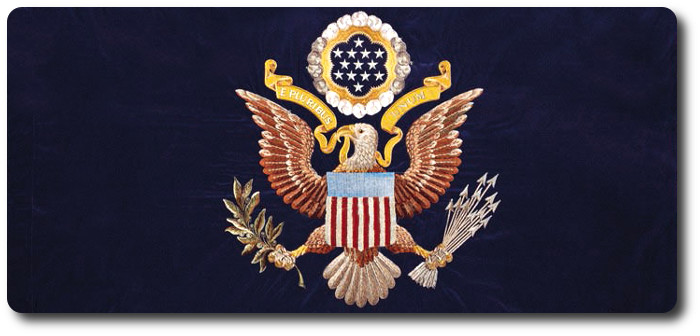
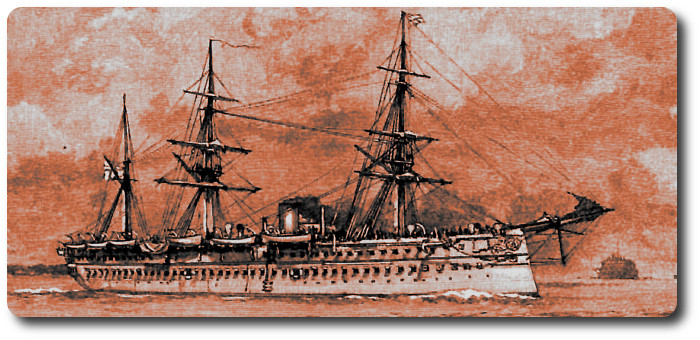
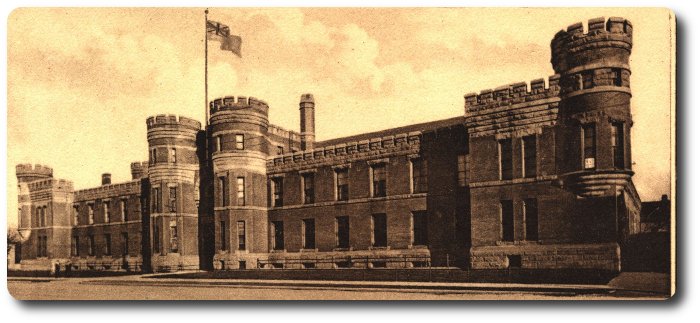
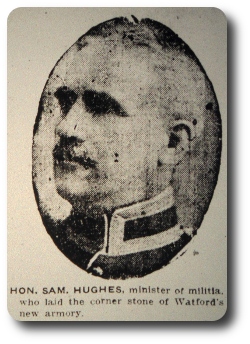 While it is not the principle of the Militia Department to interfere with the privilege of having liquor in the regimental messes, those in which abuses occur will be immediately closed, according to a statement made to The Gazette last night by Col. The Hon. Sam Hughes, Minister of Militia, who was in Montreal for the purpose of opening the St. Matthew's Church bazaar. The messes, however, he thought, should be closed at the same time as the bars. Reports are coming in from the different divisions and any action will probably be regulated by these, although no drastic change is likely to be made.
While it is not the principle of the Militia Department to interfere with the privilege of having liquor in the regimental messes, those in which abuses occur will be immediately closed, according to a statement made to The Gazette last night by Col. The Hon. Sam Hughes, Minister of Militia, who was in Montreal for the purpose of opening the St. Matthew's Church bazaar. The messes, however, he thought, should be closed at the same time as the bars. Reports are coming in from the different divisions and any action will probably be regulated by these, although no drastic change is likely to be made.
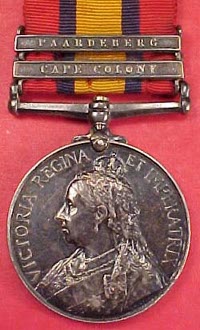 Information having been requested as to how medals should be worn, from those who have recently received their South African medal, the following is published for the information of all concerned:—
Information having been requested as to how medals should be worn, from those who have recently received their South African medal, the following is published for the information of all concerned:— His Excellency the Commander in Chief has been pleased to direct that Captain Hanson's Company, No. 1, of the
His Excellency the Commander in Chief has been pleased to direct that Captain Hanson's Company, No. 1, of the